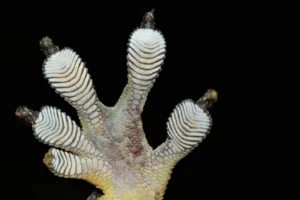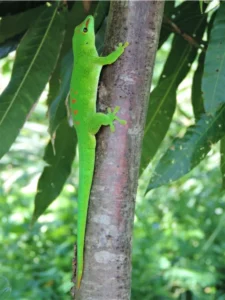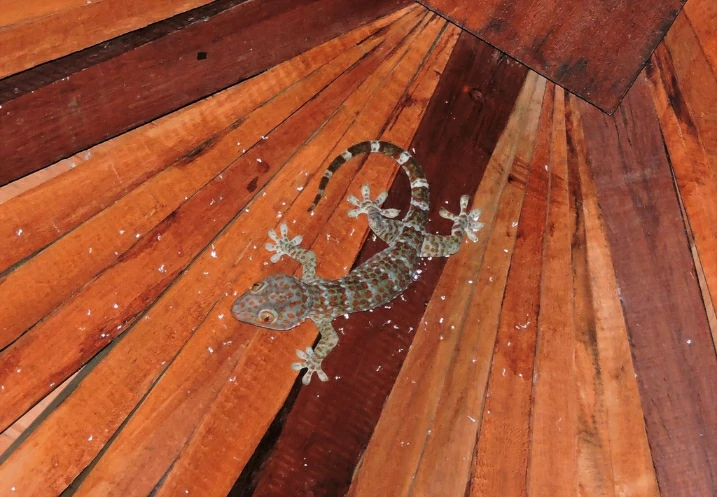It’s late at night, and you’re watching your gecko climb up the side of its tank like a tiny, fearless acrobat. One slip and it could tumble to the bottom. Your heart skips a beat, and you wonder: can geckos actually die from falling?
Yes, geckos can die from falling, but it’s actually pretty rare. Geckos are light, small, and built to cling to surfaces, so minor falls usually don’t hurt them. Serious injury or death mostly happens if they fall from a very high spot, land on a hard surface in a bad way, or are already weak from sickness or stress. But it’s not just about height, there’s more to it than that.
Why Geckos Usually Survive Falls
Geckos are amazing little climbers. Their bodies are tiny and light, their bones are flexible, and their toes have sticky pads that let them grip almost anything.
These adaptations don’t just help them climb, they also help them survive slips and falls.

Most geckos weigh just a few grams, so when they hit the ground, the force is much less than it would be for a bigger animal.
It’s kind of like dropping a feather versus dropping a bowling ball, the smaller the animal, the softer the landing.
Geckos can also spread their legs and flatten their bodies mid-fall, which slows them down a bit and reduces impact. In a way, they’re tiny skydivers, even if they’re not thinking about it.
How High Is Too High?
So how far can a gecko fall before it’s dangerous? It depends on the species and the surface they land on.
Tree-dwelling geckos, like crested geckos or tokay geckos, can survive falls of several feet because their bodies are built for climbing. Ground-dwelling species aren’t as lucky.
But there’s a limit. A fall from a really high spot, like a tall bookcase or second-story window, can be fatal; especially if the gecko lands on hard tile, wood, or concrete.
Even a short fall can hurt a baby gecko or one that’s sick, underweight, or dehydrated.
Basically, it’s not just the height that matters, it’s the combination of height, landing surface, and the gecko’s health.
When Geckos Get Injuries From Falls
Even though geckos are light and flexible, falls can still hurt them.

The most common injuries include:
-
Broken or dropped tails: Geckos can drop their tails when stressed or injured, and a hard fall can trigger this.
-
Broken toes or limbs: Less common, but possible if a gecko lands awkwardly.
-
Internal injuries: Rare, but a very high fall can cause internal bleeding or organ damage.
-
Stress and shock: Even without visible injuries, a fall can stress a gecko, which can weaken its immune system or make it stop eating for a while.
Why Some Geckos Survive Amazing Falls
You’ve probably seen videos of geckos falling off walls or ceilings and walking away like nothing happened. How do they do it?
-
Low weight, low impact: Their tiny size means gravity doesn’t hit them as hard as bigger animals.
-
Flexible skeletons: Their bones bend a little instead of snapping, which helps absorb shock.
-
Sticky toe pads: Even during a fall, they can sometimes grab a surface and slow down.
-
Tail balancing: The tail acts like a rudder, helping them rotate mid-fall and land on their feet.
Basically, geckos are built to survive small accidents. But the key word is “small.”
How Pet Owners Can Keep Geckos Safe
Falls are one of the most common accidents for pet geckos. In the wild, they land on soft leaves or dirt, but at home, they face tile, wood, and other hard surfaces.

Here’s how you can reduce risk:
-
Tank setup: Make sure climbing areas aren’t too tall or put padding underneath. Cork bark, foam, or reptile carpet works well.
-
Secure decorations: Loose branches, rocks, or hides can topple and cause a fall. Keep everything stable.
-
Monitor climbing: Some geckos are more adventurous than others. For climbers, taller soft-sided enclosures may be safer than glass tanks.
-
Handle carefully: Support the whole body when picking up a gecko. Never let it leap from your hand onto a hard surface.
-
Soft flooring outside the tank: If your gecko explores outside, use mats or towels to cushion any jumps or slips.
When a Fall Becomes Serious
Even with precautions, accidents can happen. Signs that a fall may have caused serious injury include:
-
Limping or refusing to put weight on a leg
-
Dropping its tail suddenly without obvious threat
-
Unusual lethargy or hiding more than usual
-
Loss of appetite for more than a day or two
-
Visible swelling, bleeding, or deformities
If you see any of these, contact a reptile vet immediately. Broken bones or internal injuries can get worse quickly if untreated.
Fun Fact: Geckos Can Survive Surprising Falls
In the wild, some geckos survive falls from several meters while escaping predators. Their tiny bodies spread the impact, trees and leaves break their fall, and reflexes help them land safely.
It’s amazing to watch, but it also shows why home environments can be riskier than a leafy forest.
Conclusion
So, can geckos die from falling? Yes, but it’s rare. They’re built to climb, stick, and survive small slips with their light bodies, flexible skeletons, and sticky toes.
Most minor falls won’t hurt them. Serious injuries happen mostly from high falls onto hard surfaces, awkward landings, or when the gecko is weak or stressed.
As a gecko owner, your job is to minimize risk. Provide soft surfaces, secure climbing spots, and handle your gecko carefully.
Watch for injuries or unusual behavior, and remember: even small falls can be dangerous for babies or sick geckos.
Geckos are amazing little acrobats, and with a few precautions, they can explore safely.
Give them a safe space, pay attention to their climbing habits, and you can enjoy watching their tiny, fearless leaps without turning every slip into a disaster.
Hi, my name is Ezra Mushala, i have been interested animals all my life. I am the main author and editor here at snakeinformer.com.

